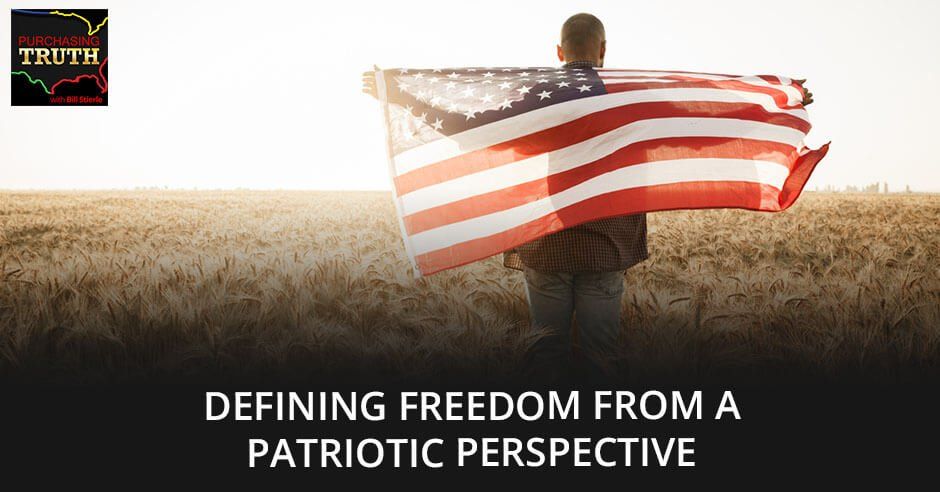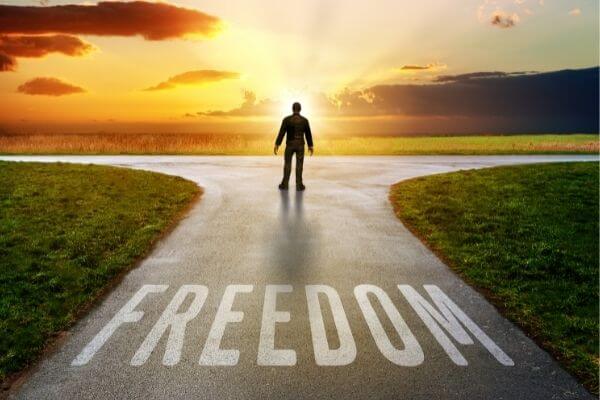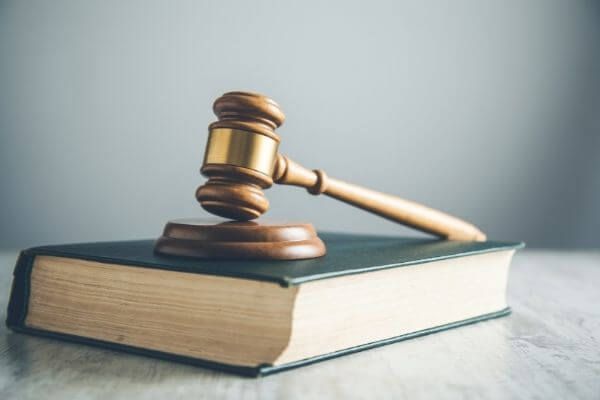Defining Freedom from a Patriotic Perspective
Subscribe Today!

Many words change meaning as time passes. Bill Stierle and Tom choose a word with an oversaturated meaning and focus their discussion on defining freedom. The duo talks about freedom from a patriotic perspective, emphasizing how it slowly veers away from individual rights and privacy. They explain how freedom becomes synonymous with liberty because of setting aside accountability and long-term consequences. Tom also shares how some establishments forced him to pay only using credit cards, opening his eyes to how simple systems can take away one's freedom to make choices.
---
Watch the episode here
Defining Freedom from a Patriotic Perspective
Bill, it’s important that we talk about defining a couple of terms that are being used by different people in different ways depending on their perspectives. The key one is freedom.
I’m glad we’re talking about this. One of the things that’s tough in the world of communication is that we realize that words are made up. We have our definitions of things. People take the different definitions in the way words mean things, and then sometimes, over time, words change their definition. Some of them even lose their meaning. The word neurotic is not even a diagnosis. It’s just a word that’s dangling out there that doesn’t have a solid meaning. Eventually, the word ego might fall into that category because people are using it for about everything.
The word freedom is being used by certain people that are not sure. If we’re talking about freedom, what are those things? Most certainly, we’re struggling with the word liberty. What does that one mean when one group can march on the capital and another person says, “It’s liberty for you to do it, but not liberty for you to break in and hurt somebody else.” That’s not liberty, especially because that’s not the primary rule that we agreed upon, which was the peaceful transfer of power.
I don’t think the average American understands the definition of the word liberty.
We don’t. It’s almost like it’s conditional. Let’s take a look at liberty.
We hear about liberty in our history classes. Everybody learned it in revolutionary times. It is as valid as it ever was. The definition of liberty is the state of being free within society from oppressive restrictions imposed by authority on one’s way of life, behavior, or political views. It makes sense why the US constitution established certain kinds of freedoms of speech, religion, and other things because liberty was something that the colonists in America had left their homelands for a better way of life. Certainly, oppressive restrictions imposed by authority are a tough one.

It is because we have authority that’s based on a set of religious and moral principles. That is what we’re going to govern everybody from this point of view, but we’re not going to do anything about the societal consequences of those things. How much money will it take? How do we keep from going on? It’s very challenging to be in our time because some of the battles that we fought many years ago are coming back and need to be fought from a perspective. Meanwhile, the person that has been fighting the battle has been entrenched in saying, “We’re going to put the right judges on so we can have it our way. Since you had the right judges to get it your way, we’re going to have the right judges on our side,” and that’s been the movement of things.
The consequence of the word liberty is that when we can’t use liberty with no relationship to freedom because you don’t have freedom if you don’t have liberty. That’s a little problematic. Are we moving more towards that society that looks over your shoulder all the time? If you're not doing anything wrong and you have nothing to worry about except for technical problems, bad angles, appearances, and perspectives of, “This is what it means when you hand it in that thing,” it doesn't. We’ve lost that ability to be compassionate or have the awareness that we’re trying to catch the wrongdoers. Who’s going to be the next group of wrongdoers? Whoever doesn’t fit our view of whatever moralistic thing is that of the person in charge, it’s not necessarily what a human right is. It’s hard.
This is tough. Let’s a couple of the last words of the National Anthem, The Star-Spangled Banner. It says, “Land of the free and home of the brave.” Freedom itself means different things depending on your perspective.
Who’s going to speak for freedom? Who’s going to hold on to that patriotic perspective? That’s the thing that’s upsetting. It’s becoming a patriotic perspective, not a value. I will have the freedom to choose the world the way I want it to choose. We don’t have a wider view of freedom. We’re getting a more narrow view of freedom.
What is it going to be like during The Star-Spangled Banner during a sports game when all the women take a knee? They’re not standing. They’re taking a knee because what are the commentators going to do when all the women take the knee during the National Anthem? It’s going to say, “I have the freedom perspective.”
This is why they’re not going to put that while you’re editing their point of view, then you’re going to choose because you don’t want to worry about the ratings. You don’t want to have the hard discussion about, “You took a group of people’s freedoms away. They don’t get to choose that because you’re setting a new law precedent for that to take place.”
No one likes to talk about abortion. It’s too dangerous and too hard to discuss because it’s a part of our life. The birth process is all a part of why we’re all here as human beings so it’s hard to talk about. If you got to talk about sex, you have to talk about the biology of it, which is also hard to talk about, or the spirituality of sex because there are a lot of different views. I don’t know if you noticed, but there are a lot of different views about the way people see and use their bodies for intimacy and sexuality. The question then is, how are we going to speak about freedom when we’re limiting it and liberty? We’re not doing those things. We’re in a very challenging position.
People are passionate about this perspective on both sides. The Democrats and the Republicans have the issues they’re looking for freedom on. Freedom doesn’t seem to mean any one thing necessarily. It depends on your perspective.
I’m glad you mentioned that because if the Democrats were talking about freedom while they want the ease in voting and more ability to make choices, they’re better about privacy issues and about, “What am I going to do with my body? I want everybody in charge of their own body,” which is a libertarian thing. For Republicans, they’re like, “I want the freedom to use guns, taxes, immigration, and religion. I like it when an authoritarian makes the decisions for me, but only my type of authoritarian, not your type of authoritarian. I would like a strong father figure that is angry but might not be truthful all the time. I don’t want the other guy that is angry about stuff that I don’t agree with.”
Accountability in the word liberty is the casualty of this discussion. We can’t have a true discussion about the impact because we’re avoiding the long-term consequence. We’ve got to look at the long-term consequence of, “Does the state want to take responsibility for the long-term consequence of a woman who doesn’t want to have a child? Are they going to put a full-out, robust adoption system in place?”
Think about what I said. Are they going to put a robust adoption system in place for children who weren’t aborted but are now alive in the world, and the state will take over because they respect life and they want life to take place? The state is like, “You had sex with somebody you don’t want, but we’ve got a child because we believe that all life is precious. Therefore, we are going to put our money where our mouth is.” That’s one thing that is not taking place.
Generally, those that are advocates of restricting or eliminating abortion are also aligned with not wanting to spend money on social programs to support that child once the child is here in the world, or the mother who needs to care for the child is not providing support for childcare so the mother can work and be a productive member of society. There are all sorts of different things. This gets very complex.

Freedom, from an oppressive law, if that’s your perspective, makes abortion illegal because you believe every life is precious and should come into the world. You would think you’re supportive of taking care of that life or supporting that mother and that child to the full extent possible once they’re here in the world. That doesn’t seem to happen.
What’s going to be a fair price for an adoption? What is the capitalist version of adoption? We’re going to set up businesses that are going to handle the excess people, the 3,500 abortions that happen in Mississippi, for example, per year. They can’t do abortions anymore, so they have 3,500 children. You got to care and feed for them. How much are you going to buy and sell those children for? Look at how crass I am. Did you see how it shifted into buying and selling children? If the state is not going to do it, is capitalism going to do it?
Has anybody seen the profit margin on a human being? It gets weird because the expectation in the mindset of liberty and freedom is that God is going to provide liberty and freedom. The person is going like, “There’s no economics for this.” There’s a good reason why the nation doesn’t have a lot of adoption and orphanages around the nation because we don’t have a lot of orphans. We don’t have a lot of full-term children that are “unwanted.” It’s hard stuff.
We don’t have a social service network and a foster care industry that’s vibrant, loving, caring, and fully supportive or the health services that go with it. We’re in a bit of a bind on this one. It’s going to be interesting to see how it plays out, but when we do speak the truth with this and we purchase truth back, this is a gray area for adults. This is not an impulse that we then pray about. How will we face this one and put our social what’s-best-for-the-nation-hat on? It’s a very complex thing. Also, when you think about it, it trickles to all the different choices that we can lose. As our society changes, is the disparity going to continue between the rich people that have access to the system and the poor people that don’t have access to the system?
That’s a very good point. It reminds me of an experience that I had. It comes to this issue of choice in a different way and also of the danger of creating a bigger divide between those that have means and opportunity and those that don’t. Is it okay If I share that with you and our audience?
Yeah. I’m interested in the story. It sounds like you had an experience here.
Within 36 hours, I had an experience at two different retail establishments. Both were food service establishments. One was in an airport as I was traveling, and one in my hometown where I went to pay for the food that I was buying with cash, and I was refused. Shockingly, my perspective was, “You don’t take cash?” They said, “No. We only take a debit card or credit card only.” I was like, “Really?” I was shocked.
Especially the one in the airport, the amount I was buying was $19.99. I handed them a $20 bill, and they said, “We don’t accept cash. We can’t make a change.” I was like, “I don’t need the change. I don’t need the penny back. You can have the $20 bill.” They were like, “We don’t accept cash.” They tried to tell me that it’s an airport policy that none of the establishments within the airport accept cash, which I knew was not truthful or wasn’t in alignment with the truth because I had purchased the water I wanted at an establishment earlier and paid cash. They were very happy to accept my cash. It made me annoyed and angry at that time.
I have the means. I have credit cards and debit cards. I could pay that way, but I wanted to use my cash and they wouldn’t accept it. I was very displeased with that, to put it mildly. That was the first time. The second time was in my hometown. I was going to buy what was a rather expensive ice tea at an establishment. It was $4.55.
It’s such a small amount of money, so I was like, “I’ll use some cash.” They wouldn’t accept cash at this restaurant either. They were like, “You have to use a credit or debit card.” I started to get angrier as I saw this cash tip jar on the counter that the serving staff was all too happy to accept a tip in cash. I was so annoyed that they wouldn’t accept cash for my purchase. Do you think I put a tip in the tip jar? No. I did not feel generous in that moment to give them a tip for their service.
I was thinking about this. As a patron or as a person, my choice was taken away for how I wanted to make payment. I started looking at it from a technical perspective. On every printed dollar bill in the United States, there’s a statement that says, “Legal tender for all debts, public and private.” I’m like, “We’re in America. I should be free to pay however I want to pay.”
I’m a business owner too. From that perspective, I’d be like, “However a customer wants to pay us, I will gladly accept their payment whatever method they prefer to pay.” I understand it when you make an online purchase. You can’t stuff cash through the computer, so there are some situations where the way you choose to purchase limits the ways you can pay.

I was trying to put myself in the perspective of somebody who has gone bankrupt or somebody who is down on their luck financially and is homeless. Since they don’t have an address, they may not be able to get a bank account and have a debit card or a cell phone account. A lot of homeless people struggle with a situation where you’ve got to have a permanent address to do certain things.
How would that hurt our society to not allow people to pay with cash? There are people that have cash as their only means of paying for something. This is going to create a bigger divide in this country and only increase the challenges that we face. I got more and more annoyed and enraged with this whole situation. I was ranting to some of my friends saying, “This is America. Unless we’re going to outlaw cash currency period and make everything electronic, then every business should be required to accept cash as a form of payment as long as you’re there in person physically to make a purchase and not phoning it in or doing something on the internet.”
If we do eliminate cash, then we need to provide the ability for all citizens to participate in the economy, and that brings the problem to the belief structure of Americans, which is there’s a group of Americans that do not like the concept of handouts. They think that the government should let everybody figure it out, but not if you’re taking away freedom and liberty from an authoritarian mindset. You can’t do both of those things. It’s hard to do both.
What cash provides is privacy and access for people in poverty to take this piece of tender and buy one meal. To be able to do that, how is the homeless person going to buy a meal when they don’t have cash? They become more dependent upon the generosity of the systems to get themselves out of the situation that they’re in.
Here’s the weird part about it. The more cash is not used by everyone, the more it’s used in the underground world, and that’s called laundering cash. We go through an experience of people in Russia laundering cash from illegal things and banks in London and in the United States where it was like, “You’re laundering cash. I’ll take your cash. It’s Russian money? You can buy this condo in Trump Tower or wherever you want to buy it.”
It’s not just him. It’s the entire system that’s not doing scary honesty about how these points of equity, equality, freedom, and liberty exist. You’ve got to fight for it. What are we going to stand for as a collective group? How are we going to talk about this in a compassionate and empathetic way to go, “I can see you want that.” We got to go for the good of society versus what the minority wants. We need to go towards what society and our world are moving towards.
I read something else. This is a quick little thing to add. Cash is not easy for our government to continue to make, especially coins. I read it costs more to make a penny than a penny is worth, and at times, it goes the other way, like a nickel because of the amount of actual nickel metal. A lot of times, a nickel costs $0.08 for the government to make.
Cash isn’t easy, but it is an equalizer in terms of what it should be and the freedom to pay for anything you need to. People talk about moving to a cashless society. I think that is going to be a real challenge to freedom and the ability for many, unfortunately, disadvantaged people in our country to be able to achieve the pursuit of happiness.
Also, let alone the world economy, which is built around the tender physical exchange of something not necessarily in a technologically-integrated world. The press towards that separation without mindful thinking of what it means to bring everybody along is upsetting for all of us.
I like this idea of the cash issue not being a good one to think about and talk about freedom because it is free from politics. As we were talking about, the word freedom is defined in different ways. What does freedom mean to you and me? It depends very much on your perspective and maybe your individual values. It doesn’t have a global definition, but the issue of having cash or not, one more of us can understand the complexities of that positively and negatively.
It’s a politically safe ground to talk through privacy. While I’m doing something privately, I prefer to pay in cash and have it not recorded anywhere.
Do I want that digital footprint of everything that I’ve done to exist? I might not.

If I go into Target with my credit card, everything that I purchased is assigned to that, including my phone number and my email. They’re tracking data, and then they’re putting those advertisements in front of me.
There’s that whole issue of privacy, but I’ll give you an even simpler one that a lot of people can relate to. When I’m going to buy my wife a gift for her birthday, my wife sees all the bills. I don’t have a credit card or a bank account that she doesn’t know or have access to. I like that because I don’t like to pay the bills and she does all that. That’s my benefit.
The tough part is if I want to buy something that’s a surprise for her birthday, I would want to use cash and go pay for something so that there is no trail and there is this element of surprise that’s real when I give it to her. I know people might think, “Only people that are doing nefarious things or not doing things they shouldn’t do would need cash,” and that’s not true at all. Privacy can be on a very practical level like a surprise on someone’s birthday.
Abortion is not in the constitution, and neither is privacy, so we have some problems coming up. A “conservative” or authoritarian person can take a SWOT at that angle of things to crank down on privacy pieces. There are people that say, “Constitution is everything.” That is a written document. It does have some good tenets in it that we want to follow through, but we are also a modern and developing society that has got to wrestle with our nature of how we can be hijacked into losing things like freedom and liberty. We do not know it.
We don’t know that we’re losing freedom, liberty, and accountability. People are not paying for things when they do something wrong because accountability is not evenly distributed throughout society. It’s like, “Who’s got the most money gets to pay for whatever accountability they want to do?” Is that the way this is going?
It could also be the freedom from accountability they might be looking for. That’s a tough one, too. There are so many things to think about and discuss.
This is a rich discussion about it. The thing that I’m hoping the audience will get to is this is what an adult does to wrestle with concepts like this. We get narrowed into this V-shape discussion of right, wrong, good, and bad instead of like, “There are nuances here. What’s best for now? Let’s go that way. What’s best for the group? Maybe that would resort to voting.” We have a lot more to talk about in this area for sure.
I enjoyed this discussion. Thanks so much.
Thanks, everybody.



